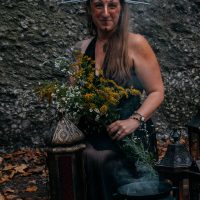So often, I get messages from people that start something like, “Can I ask you for some witchy advice?” followed promptly by an apology in case I am offended by being called a witch.
By “witchy advice,” they mean things like, “I have a rash that won’t go away,” or, “My plants are dying and I don’t know why,” or, “My daughter won’t talk to me and I can’t figure out how to heal our relationship,” or, “My mother is coming to me in dreams and I can’t figure out what she is trying to tell me…”
This is the role that women have filled throughout time. While the masculine power structures were securing the narrow path to success and fame and fortune, women were stewarding the wild chaotic mess of life.
When the doctors took over healing from the midwives, the wise women continued to bring comfort and folk remedies to those who the doctors couldn’t heal. When the priests took over the path to the divine, the grandmothers prayed the rosary for the outcast and exiled. The old widow would bring a tea for sleep to the exhausted, young mother. The fabric of interconnectedness was mended and tended by the wise women.
Those enforcing the structures of power knew that often, the wise women did not agree with their prescriptions, and the fierce love of the mothers was undermining the single path to God/money/success. This had to be stopped.
Enter the Malleus Maleficarum—The Hammer of the Witches—written by Heinrich Kramer in 1486 and published first in Speyer, Germany. This text was used to bring thousands of people to trial as witches throughout Europe and in the colonies. I will not write the history of this text here, or the gruesome details of the witch hunt craze that swept Europe until the late 1700s, although I highly recommend taking the time to learn about this dark time in our history.
The point that I want to make is that the threat that wise women (the remnants of the almost completely annihilated matrilineal societies of Europe) were eradicated using the fabricated strawman of the witch. The 40,000-100,000 (or more) people (mostly women) who were burned, hung, drowned, drawn and quartered, branded, and so on were killed for being witches.
These wise women were not witches. They were wortcunners (those who know the plants), midwives, storytellers, mothers, grandmothers, daughters. Mostly, they were women who denied the advances of men who exacted their revenge by accusing them of witchcraft, or they had angered a local villager who sought retribution for some other reason.
These women died for being women. For being wise women. For being powerful women. For being women who said “no,” who contradicted those in power. These women were brutalized, tortured, and finally murdered in front of their friends and families in public executions.
All of the onlooking women and girls received a strong message to be quiet, to stay small, to not act “too big for their britches,” lest they also be accused of suckling the devil’s spawn and find themselves on the short end of the noose.
The horrors of the witch trials are encoded in our epigenetics. We are deeply afraid of persecution, betrayal, retribution, and vengeance. We are vigilant. We watch our backs. We keep quiet when our heart screams to speak up. And we have a boiling rage in our livers from these injustices and abuses of power.
I have chosen to write about this now as we watch the world come to terms with the true history of oppression of people of color. We are decolonizing our minds and our hearts. As women, our work is also the work of finding our voices and our wisdom and our fury while the ancestral DNA screams in fear of the repercussions.
We must acknowledge that this fear is real, but we must not stop acting for justice. These systems of power have oppressed, imprisoned, tortured, disenfranchised, erased, and murdered anyone who got in their way. And now is the time for reckoning.
As women have always done, we will find our way through these trying times with our hands. We will use our hands to make things, to write our legislators, to draw signs for protest marches, to grow gardens and make beauty and tend the wounded.
We will also use our voices. I have always liked the saying, “We are the granddaughters of the witches you didn’t burn.” We must forgive our mothers for trying to keep us pruned and perfect and quiet; they were trying to save our lives. But now is the time for the witches. Now is the time for the wise women and the storytellers and the plant medicine makers and the priestesses and the valkyries. Our great great grandmothers are with us, and they are strengthening our hearts to give us courage.
So, yes, please call me a witch. I am happy to identify with women who were oppressed and persecuted for knowing the plants, for interpreting dreams, for saying no to powerful men, for knowing how to bring babies safely into the world, for remembering the cycles of the moon and how to talk to the spirits of the trees.
I stand with my ancestors whose lives were taken or whose voice was quieted by the Hammer of the Witches. It is time for us to heal the damage that this has done, and to remember the way of the wise women.


 Share on bsky
Share on bsky





Read 7 comments and reply